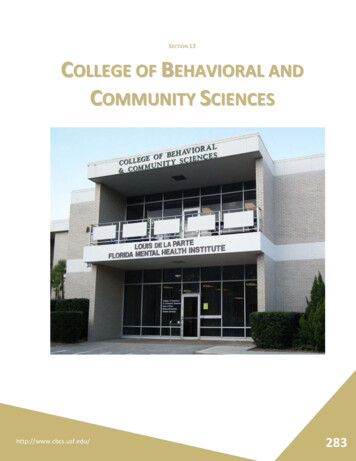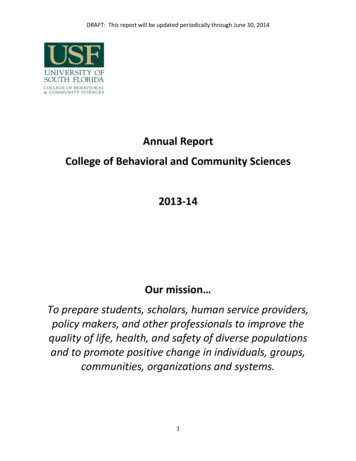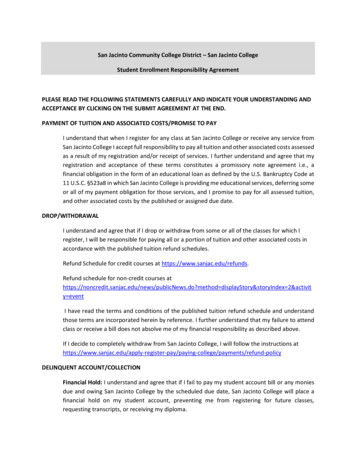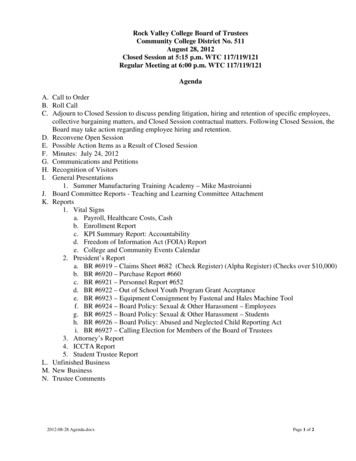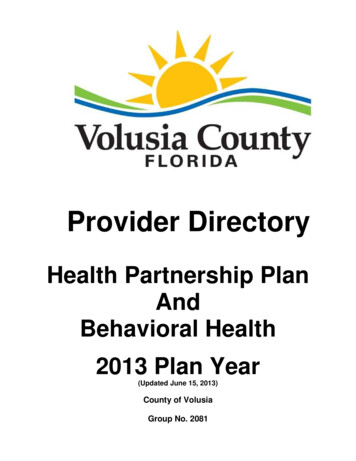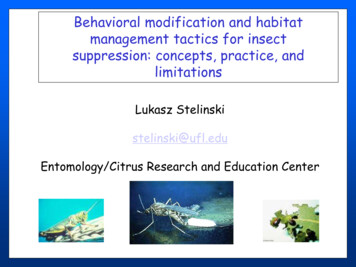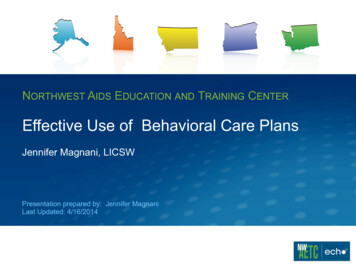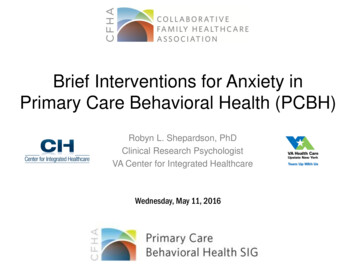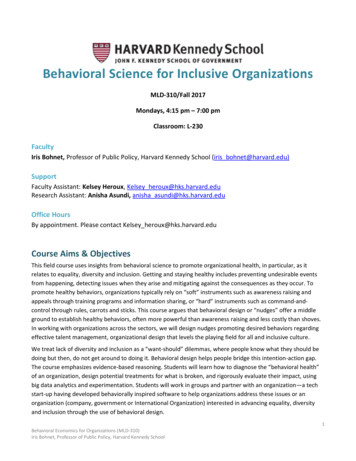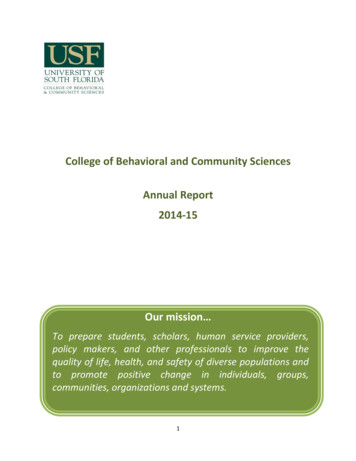
Transcription
College of Behavioral and Community SciencesAnnual Report2014-15Our mission To prepare students, scholars, human service providers,policy makers, and other professionals to improve thequality of life, health, and safety of diverse populations andto promote positive change in individuals, groups,communities, organizations and systems.1
CBCS Annual Goals: 2014-15The College initiated a new strategic plan for 2014-15. Eight goals were established in five key areas:Area 1: Student Success and Teaching Enhance the academic profile of the CBCS student population through targeted, strategic recruitment,retention, and student success activities. Develop new curricular options to promote student success and opportunity. Promote student employability through enhanced advising and career development activities.Area 2: Research and Scholarly Activity Enhance the research infrastructure of the College. Increase grant proposal funding.Area 3: Faculty and Staff Promote award and recognition programs for CBCS faculty and staff.Area 4: Community Engagement Promote community-engaged scholarship and community partnerships to enhance the research and curricularactivities of the College.Area 5: Alumni and Development Expand name recognition of CBCS as a new college with a long history by working with our alumni base.Enhance the college endowed value by building relationships with our donors.This report describes the progress the College made toward achieving these goals in 2014-15 andprovides updates on other key indicators. In addition, this report highlights the status of the college onperformance benchmarks that are part of the new Performance Based Funding (PBF) model at USF. ThePBF metrics are noted with a red asterisk. Thus, this report utilizes the following organizationalheadings: Performance Based Metrics* CBCS Strategic Plan Initiatives Key Indicators2
Area 1: Student Success and TeachingPerformance Based Metrics: Retention and Graduation* The average GPA and SAT scores of First Time in College (FTIC) students enrolling in CBCS remainedrelatively stable over the past two years as did FTIC retention rates. The FTIC graduation rate increasedsignificantly.FTIC Entering GPA*Benchmark 13.97Benchmark 23.89Fall, 2013Fall, 2014SAT Score*FTIC Fall to Fall Retention rate*17241755Fall, 2013Fall, 201485%86%Fall, 2012 to 13Fall, 2013 to 14FTIC Six-Year Graduation Rate*66%84%2007-13 cohort2008-14 cohort The percentage of students graduating withoutexcess hours increased from 77% (2012-13) to 82%(2013-14). * The number of CBCS doctoral degrees awardedincreased from 24 in 2012-13 to 31 in 2013-14.* The number of students completing theirundergraduate degree increased from 704 in 2012-13to 736 in 2013-14. The number of master’s degrees awarded increasedfrom 224 to 284.MA, Rehabilitation & Mental Health Counseling GraduatesPerformance Based Metrics: Degrees Awarded in Areas of Strategic Emphasis*The Board of Governors identified five areas of strategic emphasis within the State University System: Education,Health, Global Competitiveness, STEM, and an area called “gap analysis,” i.e., degree programs leading tooccupational categories identified as under-supplied in labor market projections. CBCS programs within areas ofstrategic emphasis include: Communication Sciences & Disorders, Audiology, Speech Pathology, Gerontoloy, AgingStudies, Long Term Care Administration, and Rehabilitation Counseling. Approximately 25% of the bachelor’s degrees awarded by CBCS were in programs designated by the BOGas areas of strategic emphasis.* Approximately 44% of the graduate degrees awarded by CBCS were in programs designated by the BOGas areas of strategic emphasis.*3
Key Indicators: Instructional Productivity Instructional productivity continued at a high level butdeclined slightly with the production of 67,459 SCH in 201415. Tuition revenue also declined slightly.FY 12FY 13FY 14FY 15(est.)Gross Revenue 12.40 m 13.80 m 14.33 mTotal Waivers 1.29 m 1.21 m 1.17 mNet Revenue 11.10 m 12.53 m 13.15 m 14.38 m 1.43 m 12.95 mCBCS Strategic Plan Initiative: Targeted Recruiting and Retention Activities A new undergraduate recruitment brochure was developed tohighlight the opportunities available to students in CBCSacademic programs and unique opportunities such asundergraduate research. CBCS participated in the Fall Week of Welcome by hosting aphoto booth for students to have their picture taken with theDean and Rocky the Bull. As part of the Spring Week of Welcome, CBCS sponsored apizza party and information session for new and returningstudents in three locations (MHC, PCD, and SOC). The CBCS Student Services staff and academic advisorsparticipated in six Saturday campus recruiting events and fourFriday events for newly admitted students.CBCS Strategic Plan Initiative: New Curricular Opportunities Through On-Line Programs The new Master’s in Child and Adolescent Behavioral Health mounted a fully on-line masters program.The first cohort of 22 students began classes in Spring, 2015. The ABA program initiated a new on-line graduate certificate. Due to sudden changes in therequirements for certification, the department decided to expand the program to a fully on-line master’sdegree in Applied Behavior Analysis as a self-supporting program. The Department of Criminology developed a 2 2 program for transfer students to complete the B.A. inCriminology fully on-line. Marketing activities were initiated in spring, 2015 with plans to admit a firstcohort in Spring, 2016.4
Approximately 4,700 students enrolled in 92 sections of courses offered on-line by CBCS faculty in 201213. In comparison, 6,159 students enrolled in 129 sections of on-line courses offered by CBCS faculty in2013-14. Innovative Education provided funding and technical assistance for CBCS faculty to develop new on-linecourses. Since the InEd pilot program started in Spring, 2014, 34 CBCS courses have been converted toon-line delivery formats, including five for the new Cybersecurity certificate. The School of Social Work Curriculum Committee developed a plan to convert a series of three on-linecourses for students in the BSW and MSW programs. The College offered three courses as part of the 2015 Maymester to assess the potential of intensified online delivery of selected curricular offerings.CBCS Strategic Plan Initiative: New Curricular Opportunities Through Accelerated Programs A new accelerated bachelor-master’s degree proposal was developed to provide advanced undergraduateBehavioral Healthcare majors with the opportunity to begin the Master’s in Mental Health &Rehabilitation Counseling while they are completing their B.S. degree. Implementation is scheduled forFall, 2015 pending final approval by the Graduate Council.Key Indicators: Program Highlights The 2014-15 graduating class of the MACJA program will include the 200th program graduate since theprogram began in 2006.ABA doctoral student Mallory Quinn was selected as a winner of the USF 6th Annual Graduate Studentand Postdoctoral Symposium.ABA students published 15 papers/chapters in 2014, submitted 20 additional manuscripts, presented 31papers at the 2014 Association for Behavior Analysis International Conference, presented 33 papers at the2014 Florida ABA conference with student and faculty authors, and presented 40 papers at theCommunity Applications of Behavior Analysis annual meeting.Alex Toth, an incoming doctoral student in Criminology, was awarded the prestigious and highlycompetitive USF Presidential Fellowship to complete his doctoral studies.The M.S. in SLP program successfully graduated its 4th cohort of students in the Suncoast Distanceprogram, in collaboration with the Suncoast School Districts and USF-CSD. The seventh cohort of studentswas also admitted.The Behavioral Healthcare major, in only its third year, has grown to approximately 200 majors and hasadded two new concentrations.Four CBCS students won awards for their research presentations or posters at the 2015 USFUndergraduate Research and Arts Colloquium.Students in the joint USF/UCF master’s program won first place at the 2015 Praxis Bowl at the FloridaAssociation of Speech Language Pathologists and Audiologists.5
CBCS Strategic Plan Initiative: New Curricular Opportunities As Global CitizensDr. Larry Thompson, MHLP, led study-abroad programs to northernItaly during spring break, 2014 and 2015. The 24 participantsobtained a global perspective of mental illnesses and treatment.Students in the 2015 program visited eight hospitals and outpatientclinics in Italy that utilize evidence-based practices for individualswith schizophrenia, eating disorders, depression and anxiety.Dr. Mark Englehardt, MHLP, offered study-abroad programs toIreland in 2014 and 2015. Participants studied homelessness andbehavioral healthcare in Ireland and contrasted services withthose in the United States. Twenty-one students will haveparticipated following the completion of the 2015 summerprogram.Drs. Manisha Joshi and Iraida V. Carrion, SSW, led 15 students tothe northeast Himalayan region in India as part of the School ofSocial Work’s first study abroad program. Participants studied thesocio-cultural context of the health of indigenous people.Students experienced the diversity of northeast India, particularlythe state of Arunachal Pradesh, popularly known as the Land ofRising Sun.Dr. Rick Weinberg, RMHC, sponsored a summer study-abroadprogram to Florence, Italy. Thirty-six students participated as part ofthe Intimate Relationships course for Rehabilitation & Mental HealthCounseling. A second program is scheduled for Summer, 2015.Dr. Michelle Bourgeois established a new undergraduateelective course on Global Issues in CSD that included a weeklong Study Abroad opportunity in Brazil during spring break.6
CBCS Strategic Plan Initiative: Student Employability & Career Development Services The Office of Student Services partnered with the USF Career Services to offer two workshops for CBCSstudents on preparing resumes and graduate school applications. Two workshops were conducted for CBCS students on Interviewing and Internship Etiquette. CBCS initiated plans with the Office of Career Services to host a Health Professions and Social ServicesInformation and Networking Fair in Fall, 2015. The School of Aging Studies provided resume critiques and conducted practice interviews withprospective graduates. Over 25 community partners participated in the School of Aging Studies Careers inAging Week events, matching potential employers with students. The Criminology program developed a career speaker series for the Fall and Spring semesters to exposestudents to career opportunities in law enforcement and criminal law.Performance Based Metrics: Employment and Wages* The percent of bachelor’s graduates employed in Florida following graduation was at or above thestatewide level for all CBCS undergraduate programs in 2013. Data for 2014 were not yet available at thetime the CBCS Annual Report was prepared. * The median average full-time wages of undergraduates employed in Florida one year after graduationwas at or above the state average for all CBCS programs with the exception of Social Work which wasslightly below the statewide average. Data for 2014 were not yet available at the time the CBCS AnnualReport was prepared.* Graduates of the M.S. in SLP and Au.D. programs experienced a 100% employment rate. Aging Studies has a 100% post-graduation placement (in the profession or in a doctoral or professionalprogram) for the last two cohorts of graduates from the MA program in Gerontology. All Ph.D. students completing the Aging Studies doctoral program have gone on to postdoctoral,academic, or research institute positions upon graduation. All but one of the 2014 graduates of the B.S, in Long-Term Care Administration received their NHA licenseand were hired as nursing home administrators or assistant administrators throughout Florida. The undergraduate internship program in Criminology experienced a 45% hiring rate. The programinvolves over 100 agencies and places about 40-50 students per semester. In the past five years, the number of graduates from the M.S. in Rehabilitation & Mental HealthCounseling who obtained employment ranged from 85% to 96%. Through a partnership with the Hillsborough County Sheriff’s Office, Criminology held a recruitment eventat which USF students could take the preliminary tests, interviews, and physical abilities test on site.Eighteen students participated and 8 were hired by the Sheriff’s Office.7
Area 2: Research and Scholarly ActivityCBCS Strategic Plan: Increase grant proposal funding CBCS had 27.4 million in total awards in FY14.This represented a 2million increase over theprior year. As of May 27, 2015, new awards toCBCS faculty totaled 29 million, a significantincrease over prior years. Federal funding was 12,575,472, representing a 3M increase over the prior year. The number of proposals submitted increasedfrom 117 in 2013 to 129 in 2014. F&A returns generated by the college increased from 2.79 million in 2013 to 2.88 million in 2014; thetotal indirect cost return rate declined slightly (11.5% to 11.0%).Performance Based Metric: Research Expenditures* Two metrics are used by USF to report research expenditures: Total R&D Expenditures and FederalResearch Expenditures. In both cases, CBCS experienced a significant increase in research expenditures.*2013-142014-15Total R&D Expenditures 34.02 m 36.75 m*Federal Research Expenditures 20.98 m 22.18 m*Research expenditures per tenured/tenure earning faculty member (TTE) increased from 353,608 in2012-13 to 375,131 in 2013-14.Performance Based Metric: Postdoctoral Appointees* Due to a change in the methodology in counting positions eligible for postdoctoral appointments, thenumber of CBCS postdoctoral appointments declined from 25 in Fall, 2013 to 8 in Fall 2014. However, thiscontinues to be an important area for the College to pursue and funds have been requested to expand theCBCS postdoctoral appointments. *Performance Based Metric: Number of Citations* The University was not yet able to provide historical data for the number of citations for CBCS faculty.*However, the faculty continued their strong record of research dissemination by publishing 219 articles,16 books, 79 chapters in books, and 71 research reports. In addition, the faculty made 391 presentationsat international, national, and regional conferences.8
40--1Presentations391150467270214424CBCS faculty published 24 articles in fourteen journals that are in the ‘top ten’ of their respective subjectcategories. In addition, CBCS faculty published in the four of the top journals in the subject categories ofCriminology & Penology, Rehabilitation, Women’s Studies, and Special Education.Performance Based Metric: Patents Awarded* CBCS faculty and postdoctoral fellows applied for two patents this year as follows:Frisina, R. D., Walton, J. P., Ding, B., & Zhu, X. (2014). United States Patent No. (Provisional). Hormonetreatment for age-related hearing loss - presbycusis.Ozmeral, E. J., & Ozmeral, A. C. (2014). United States Patent No. 62/032,699 (Provisional). Voice TallyingSystem.Performance Based Metric: Faculty AwardsThree CBCS faculty received Fulbright Scholar Awards. Dr. Amber Gum, MHLP, will conduct research in Israel inSpring, 2016 at the Bar-Ilan University. Dr. Roger Peters, MHLP, will pursue research onsubstance abuse at the University of Cape Coast, Ghana,Africa in Summer, 2015. Dr. Lisa Brown was a Fulbright Specialist with theUniversity of the West Indies, Mona, Jamaica, where sheprovided consultation on the development of academicprograms in Gerontology.9
Other faculty awards of distinction included:Dr. Michael Leiber, Jennifer Peck and Maude Beaudry-Cyr received the Outstanding Paper Award fortheir article When Does Race and Gender Matter? The Interrelationships between the Gender ofProbation Officers and Juvenile Court Detention and Intake Outcomes. Dr. Leiber also received theBecky Tatum Excellence Award from the Academy of Criminal Justice Association for hiscontributions to criminal justice education and scholarship concerning ethnicity, race, and gender.Dr. Michael Barker, CSD, received the 2013 AAC Editors' Best ResearchPaper award for his paper Support for AAC Use in Preschool, and Growth inLanguage Skills, for Young Children with Developmental Disabilities.Dr. Bryanna Fox, Criminology, received the Nigel Walker Prize from the University of Cambridge forthe best Ph.D. thesis in criminology submitted in 2013. She also received the Ralph E. Powe JuniorFaculty Enhancement Award by Oak Ridge Associated Universities (ORAU).In 2014, Dr. Elaine R. Silliman, CSD, received Honors of the Association, thehighest award that the American Speech-Language-Hearing Association(ASHA) confers.Dr. Tammy Jorgensen Smith, RMHC, received the National Association for People Supporting EmploymentFirst (APSE) Research Award for developing innovative strategies that promote self-determination, fullinclusion, and competitive employment opportunities for persons with complex disabilities.Dr. Kathleen Heide, Criminology, received the 2014 Carolyn Rebecca BlockAward from the Homicide Research Working Group. This award recognized hersignificant contributions to the study of homicide by a scholar-practitioner.Dr. Elizabeth Perkins, CFS, received the designation of Fellow of the American Association onIntellectual and Developmental Disabilities (FAAIDD).Dr. Celia Lescano, MHLP, was awarded Fellow status within Division 54 of theAmerican Psychological Association. She was also awarded the 2015 Award forDistinguished Contributions to Diversity in Pediatric Psychology by Division 54 of theAmerican Psychological Association.10
Dr. Khary Rigg was awarded fellow status with the University ofPennsylvania Center Public Health Initiative for his leadership andsignificant advancement of public health. He also received the 2015Junior Scholar Award from the American Sociological Association,Alcohol, Drugs, and Tobacco Section.Dr. William Kearns, RMHC, was one of three posters receiving a certificateof honor at the 9th Annual World Conference of Gerontechnology. Theposter was entitled Location Aware Smart Watch to Support Aging inPlace.Dr. Iraida Carrion, Social Work, received the Outstanding Poster in ResearchAward at the Social Work Hospice & Palliative Care Network conference in2014 for her poster Healthcare Providers' Roles and Responsibilities forInitiating End-of-Life Care Communication.Dr. Guitele Rahill, Social Work, was awarded a McKnight Junior FacultyDevelopment Fellowship (JFF) for the 2014-2015 academic year.CBCS Strategic Plan Initiatives: Enhance the Research Infrastructure The CBCS Faculty Council approved the establishment of the CBCS Research Council. RFPs were generated for an Internal Grant program and an International Travel program. Six applicationswere received for the Internal Grant program and two applications were received for the InternationalTravel program. The Associate Dean for Research provided consultative assistance for faculty submitting proposals andinitiated a process to obtain external reviewers for large applications prior to submission. A new Research Forum was established and ten workshops were held on topics such as writing patientcentered outcomes research institute (PCORI) grants, research collaborations, creating impact alt-metrics,Science Network Curriculum Vitae (SciENcv), Diversifying Your Funding Portfolio, Essentials of ProjectManagement, Data Management Plans. The College partnered with the USF Office of Research to purchase over 375,000 in new researchequipment for CBCS researchers.11
Area 3: Faculty and StaffCBCS Strategic Plan: Promote Award and Recognition Programs for Faculty and Staff The Facul
Four CBCS students won awards for their research presentations or posters at the 2015 USF Undergraduate Research and Arts Colloquium. Students in the joint USF/UF masters program won first place at the 2015 Praxis owl at the Florida Association of
